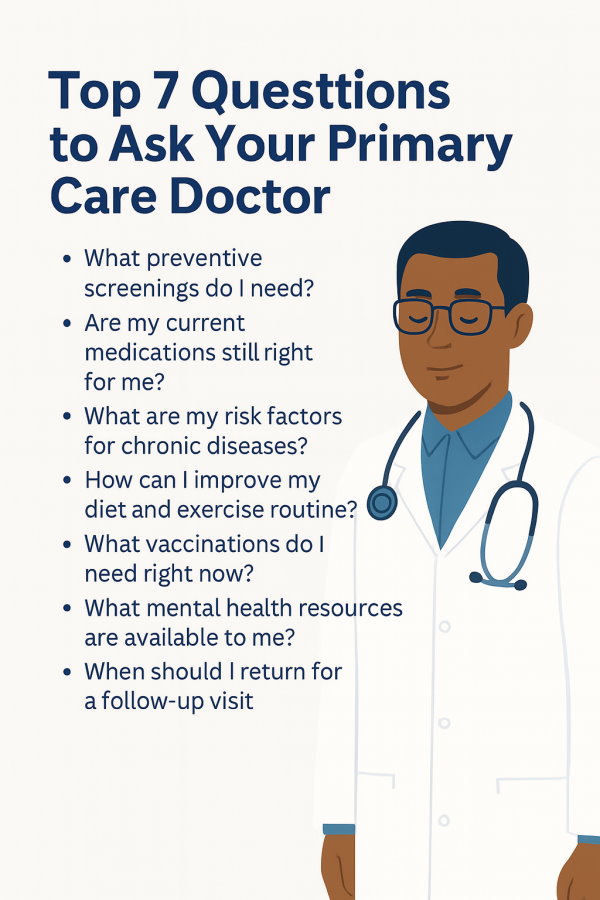
Why Asking the Right Questions Matters
The Importance of Communication in Healthcare
Good communication with your primary care doctor is key to better health outcomes. Many patients feel rushed or forget what they wanted to ask during an appointment. But asking thoughtful, informed questions can make all the difference in understanding your condition, receiving accurate treatment, and preventing future health problems.
How It Affects Your Diagnosis and Treatment
When you ask questions, you help your doctor see the full picture. Whether it's unexplained symptoms or side effects from medication, your insights guide their decisions. It’s a two-way street—while your doctor provides expert advice, your concerns shape the direction of your care.
Preparing for Your Appointment
Gathering Your Medical History
Before heading to your appointment, take time to review your health history. This includes past illnesses, surgeries, allergies, medications, and any family history of conditions like diabetes or cancer.
Listing Symptoms and Concerns
Write down any symptoms you're experiencing—when they started, how severe they are, and what makes them better or worse. Bring this list with you to ensure nothing gets overlooked during the visit.
Question 1 – What Preventive Screenings Do I Need?
Based on Age, Gender, and Family History
Preventive screenings are vital for detecting diseases early. Ask your doctor which tests are recommended for your age, gender, and personal risk factors. This may include mammograms, colonoscopies, cholesterol checks, or bone density scans.
Importance of Early Detection
Early detection can dramatically improve treatment outcomes. For instance, finding high blood pressure or prediabetes early gives you a better chance to reverse or manage the condition.
Question 2 – Are My Current Medications Still Right for Me?
Reviewing Side Effects
Medications affect people differently over time. Side effects you once tolerated may become problematic, or your condition might have improved to the point where adjustments are needed.
Checking for Drug Interactions
If you’ve started taking new supplements or over-the-counter drugs, make sure they don’t interfere with your prescriptions. Your doctor can help review all medications for safety and effectiveness.
Question 3 – What Are My Risk Factors for Chronic Diseases?
Diabetes, Heart Disease, Cancer
Understanding your risk factors helps you take proactive steps. Your doctor can assess your lifestyle, weight, family history, and lab results to determine your risk for chronic diseases.
Lifestyle Modifications
If you’re at high risk, your doctor can guide you on diet, exercise, quitting smoking, or managing stress. Early action can delay or prevent the onset of many conditions.
Question 4 – How Can I Improve My Diet and Exercise Routine?
Personalized Recommendations
Instead of following generic advice, ask your doctor for recommendations tailored to your needs. They may suggest a specific calorie target, fitness plan, or dietary change based on your lab results or goals.
Referrals to Specialists Like Dietitians
If your doctor sees a need, they can refer you to a registered dietitian, physical therapist, or personal trainer for more specialized guidance.
Question 5 – What Vaccinations Do I Need Right Now?
Adult Vaccines Update
Vaccines aren’t just for kids. Adults need protection too. Make sure you’re up to date on tetanus, shingles, pneumonia, and COVID-19 vaccines.
Flu, Shingles, and COVID-19 Shots
Ask your doctor which shots are appropriate for your age and health status. Staying vaccinated lowers your risk of serious illness and protects those around you.
Question 6 – What Mental Health Resources Are Available to Me?
Discussing Stress, Anxiety, Depression
Mental health is just as important as physical health. Be honest about how you’re feeling emotionally. If you're experiencing anxiety, depression, or overwhelming stress, your doctor can help.
Therapy, Medication, and Support
Your doctor might recommend counseling, medication, or local support groups. Early intervention can prevent mental health issues from becoming debilitating.
Question 7 – When Should I Return for a Follow-Up?
Tracking Progress
Understanding when to return for another visit helps you stay on top of your health goals. Whether it’s to review blood work or monitor a condition, ask for a clear follow-up plan.
Managing Ongoing Conditions
Chronic illnesses often need regular monitoring. A follow-up schedule ensures that your condition stays under control and treatment stays effective.
- Extra Tips for Making the Most of Your Visit
- Bring a written list of questions
- Take notes during the appointment
- Bring a friend or family member for support
- These small actions can greatly improve the quality of your visit.
- Common Mistakes Patients Make During Appointments
Not Being Honest
Some patients hold back due to embarrassment or fear of judgment. Remember, your doctor is there to help, not judge.
Forgetting Important Questions
It’s easy to forget concerns once you’re in the exam room. That’s why having a written list is so helpful.
How to Build a Better Relationship With Your Doctor
Trust and Transparency
Being open and building a rapport helps your doctor understand your needs better. It also makes it easier to follow medical advice.
Continuity of Care
Seeing the same doctor regularly helps build trust and improves long-term care. They’ll know your history and notice subtle changes over time.
F.A.Q.
Yes, having someone else there can help you remember details and provide support.
Absolutely. Your doctor should explain all test results clearly.
Write down your concerns in advance and take deep breaths before your visit. It’s okay to be anxious.
You can call your doctor’s office later or send a message through their patient portal.
Yes, and let your doctor know upfront so they can manage time effectively.
Yes, bring a list or the actual bottles of all medications and supplements you take.

Take Charge of Your Health Today
Walking to your doctor doesn’t have to be intimidating or overwhelming. In fact, open and honest communication is one of the most powerful tools you have to protect and improve your health. By taking just a few minutes to prepare in advance and ask the top 7 questions to ask your primary care doctor, you're not only participating in your care—you're leading it. These questions empower you to understand your risks, stay updated on preventive care, and make informed decisions about treatment options.
Remember, your doctor is your partner in health. The more clearly you communicate your concerns, the better they can help you achieve your wellness goals. So the next time you schedule an appointment, don’t hesitate. Bring your questions, speak up, and advocate for yourself—because your health deserves nothing less than your full attention and your strongest voice.
The Impact of Loneliness and Social Isolation on Older Adults
Jimenez2024-11-16T23:00:41+00:00March 6, 2024|Categories: elderly, Mental Disease|
Loneliness and social isolation are distinct yet interrelated concepts that significantly impact the well-being [...]
How to have and keep a healthy and beautiful skin
Jimenez2024-11-16T23:01:14+00:00January 4, 2024|Categories: Skin Health|Tags: beautiful skin, skin, skin protection|
While there isn't a one-size-fits-all approach to achieving healthy skin, here are 10 widely [...]





